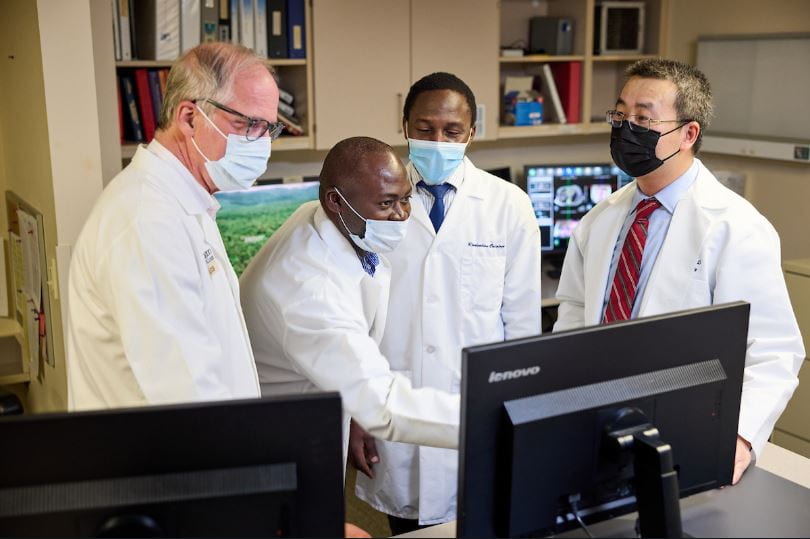Seed grant funding fuels innovative ideas at the earliest stage of development. It allows researchers to gather preliminary data critical to securing subsequent funding for projects that advance human health and humanity.
The McDonnell International Scholars Academy at Washington University, with support from the Office of the Provost, awards seed grants that stimulate high-impact research linking university experts with our partners around the world. These investments help research teams, often representing cross-disciplinary fields, demonstrate the power and potential of their work.
Leveraging and strengthening global partnerships that harness the power to change lives for the better, the 2022 seed grant cycle has already resulted in a nine-fold return on the university’s investment.

Seed grant cycle has already resulted in a nine-fold return on the university’s investment.
These seed grants have resulted in major external funding for research projects that reduce and prevent chronic disease in Nigeria, introduce new treatment protocols for cancer patients in Uganda, and seek out and employ new quantum materials to advance next-generation electronics.
Research builds upon seminal work
According to a 2023 report from the World Health Organization, Nigeria accounts for the highest number of maternal deaths globally, with many of these being the result of poor cardiovascular health.
“Nigeria, the 7th most populous country in the world, is at high risk for poor maternal cardiovascular health, a challenge that is likely to increase as nearly 50% of the population is under 20 years old,” said Mark Huffman, co-director of Washington University’s Global Health Center and multiple principal investigator of a project to improve intergenerational health in Nigeria.
Huffman, multiple principal Victor Dávila-Román, director of the Global Health Center, and a team of researchers from Washington University and the University of Abuja, including multiple principal investigators, Dike Ojji and Godwin Akaba, recently were awarded $2.9 million from the National Heart Lung and Blood Institute (NHLBI) to conduct their research on “Enhancing Intergenerational Health in Nigeria: Peripartum as Critical Life Stage for Cardiovascular Health (ENHANCE CVH).”
This NIH funding was made possible, in part, by support from the McDonnell Academy seed funding that we received last year. It is our hope that this work will lead to developing, implementing, and evaluating new policies to improve maternal cardiovascular health and health care in Nigeria and serve as a model for other countries.
Mark Huffman
This research builds upon seminal work conducted in St. Louis by Brown School faculty Debra Haire-Joshu, the Joyce and Chauncy Buchheit Professor in Public Health, and Rachel Tabak, research associate professor, in collaboration with Dávila-Román and Parents as Teachers (PAT), a St. Louis-based national organization. Most recently, this team was awarded a grant from the NHLBI to conduct the “Early Intervention to Promote Cardiovascular Health of Mothers and Children (ENRICH)” program.
The ENRICH program at Washington University served as the basis for the ENHANCE CVH program in Nigeria. The team will focus on improving maternal health behaviors that are likely to result in improved maternal, child, and overall family cardiovascular health as a central strategy. The ENHANCE CVH study will test the PAT home-based intervention using trained community health extension workers and nurse educators to promote cardiovascular health by addressing cardiovascular risk factors and encouraging healthy eating and living practices.
“We are eager to both contribute to research in Nigeria, and bring research lessons back home to St. Louis, where we also have a high burden of maternal cardiovascular disease, following our Global Health Center Local-Global-Local model,” said Dávila-Román.
Seed grant-funded project helps secure significant gift
In efforts to advance cancer treatment for patients in Uganda, Tianyu Zhao saw an opportunity to help reduce the high level of cancer deaths globally, with 75% occurring in the developing world.
A seed grant from the McDonnell Academy and the Office of the Provost in 2022 set Zhao, associate professor of radiation oncology, on a course to improve cancer care and help save the lives of those with little means. Zhao joined forces with colleagues at the Uganda Cancer Institute, an affiliate of Makerere University Medical School in Kampala, to create and implement a radiation therapy plan key to effectively managing cancer. As a result, the team was able to lower the treatment cost to patients, improve the use of advanced radiation therapy, and reduce the training requirement for medical professionals through automation and deep machine learning.

This success led the research team to Botswana, where they treated the first radiotherapy patient in the country. “Moving forward,” Zhao said, “we are committed to providing ongoing training and on-site support for Brachytherapy —a critical therapeutic approach for prostate and gynecological cancers. We anticipate introducing this support in 2024 to meet the critical needs of these patients.”
Zhao’s seed-funded project also helped secure a significant gift that will increase access to cancer treatment. Varian, a company that develops, builds, and delivers innovative cancer care technologies to entities around the globe, made a pledge to fund the purchase of Halcyon, a leading-edge treatment system capable of performing online adaptive radiotherapy.
“None of these achievements would have been possible without the support from the McDonnell Academy,” Zhao said.
Seed grant helps establish global collaboration
In 2021, Sheng Ran, assistant professor of physics in Arts & Sciences, sought to bridge a gap between the experimental realization of topological superconductor-based computation and the theoretical proposals that dominated the field. With the support of a McDonnell Academy seed grant, Ran partnered with colleagues at Fudan University to accelerate the discovery of topological superconductors considered a linchpin technology for future quantum computing technologies. To achieve this, the team employed combined techniques of data-driven machine learning, single crystal synthesis and quantum transport, and thermodynamic measurement.
The McDonnell Academy seed grant allowed us to establish our collaboration with our colleagues at Fudan University and collect preliminary results, both of which turned out to be crucial for getting the NSF CAREER award.
Sheng Ran
This work has helped Ran win a prestigious Faculty Early Career Development Program (CAREER) award from the National Science Foundation. The $745,869 grant will fund his project “Discovery and Characterization of Strongly Correlated Topological Materials.” “The McDonnell Academy seed grant allowed us to establish our collaboration with our colleagues at Fudan University and collect preliminary results, both of which turned out to be crucial for getting the NSF CAREER award.” Ran said, “I hope we will be able to discover existing quantum materials that will be useful to advance next-generation electronics.”
Seed Grants
The McDonnell International Scholars Academy is a catalyst for collaborative research across countries and disciplines. Through its seed grant initiatives, in the last three years the McDonnell Academy launched more than 60 new research projects in 30 countries.